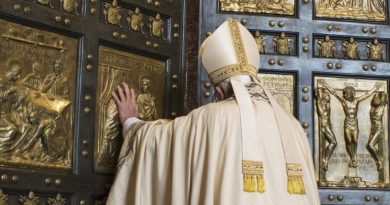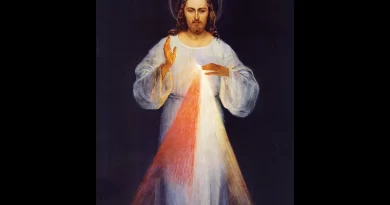St Thomas Aquinas: Doctor Eucharisticus
This year, 2023, we are celebrating the 700th anniversary of St Thomas Aquinas canonization. It was precisely on July 18, 1323, when this great doctor of the Church was canonized by the Avignon Pope John XXII.
Thomas is also called Doctor Eucharisticus since he has written so well on the mystery of the Eucharist. For Aquinas the sacrament of the Eucharist is love itself in all its spheres. No wonder why he came to the great conclusion that the Eucharist really epitomizes the entire spiritual life. He writes: The Eucharist is the sacrament of love: it signifies love, it produces love. The Eucharist is the consummation of the whole spiritual life.
In front of this great sacrament of charity the humble Thomas could only stay dumbfounded and marveled by God’s infinite condescendence. The Eucharist is the summit of what the Church is and should be. He said: O how unspeakable is this Sacrament which sets our affections ablaze with charity. … It is the fulfillment of Christ’s Mystical Body.
In relating to Jesus present in the Eucharist, Thomas saw himself so small, sick and weak. As a real great saint as he was Thomas ran to Jesus to heal him from his weakness and sinfulness and ardently and humbly asked him to strengthen and sanctify him by His grace. He thus confessed: Almighty and Eternal God, behold I come to the Sacrament of Your only-begotten Son, our Lord Jesus Christ. As one sick, I come to the Physician of life; unclean, to the Fountain of mercy; blind, to the Light of eternal splendor; poor and needy, to the Lord of heaven and earth. Therefore, I beg of You, through Your infinite mercy and generosity, heal my weakness, wash my uncleanness, give light to my blindness, enrich my poverty, and clothe my nakedness. May I thus receive the Bread of Angels, the King of Kings, the Lord of Lords, with such reverence and humility, contrition and devotion, purity and faith, purpose and intention, as shall aid my soul’s salvation…
The humble Thomas had such a high love for the Eucharist because it is the Sacrament of the Lord’s Passion. He states: The Blessed Eucharist is the perfect Sacrament of the Lord’s Passion, since It contains Christ Himself and his Passion. It is because the Eucharist is the Sacrament of Christ’s Passion that Aquinas encouraged a lot the daily reception of the Eucharist. The more one draws near to Christ the more one is changed in his very presence. Obviously he was well aware that one is to receive the Eucharist reverently and not arrogantly. Hence, if frequent reception of the Eucharist will expose one to abuse of the sacrament the Eucharistic Doctor advises that one receives it when one is really prepared for it. He says: If someone knows from experience that daily Communion increases fervor without lessening reverence, then let him go every day. But if someone finds that reverence is lessened and devotion not much increased, then let him sometimes abstain, so as to draw near afterwards with better dispositions.
In Thomas Aquinas’ Eucharistic theology we find that the Eucharist is the sign of supreme love and hope. The Angelic Doctor wrote that the Eucharist is perfective of all the other sacraments, in which Christ’s virtue is participated (Summa, III, 75, 1, c.). Moreover, he also asserts that when Christ was going to leave his disciples in his proper species, he left himself with them under the sacramental species. It is for this purpose then that Jesus instituted the sacrament in order that there should be at all times among men something to show forth our Lord’s Passion, provided that “without faith in the Passion there could never be any salvation” (Summa, III, 73, 5, c.).
In his Summa Theologica, St Thomas writes that in our pilgrimage, [Christ] does not deprive us of his bodily presence, but unites us with himself in this sacrament through the truth of his Body and Blood (Summa, III, 75, 1, c.), always seen in their sacrificial condition. The conclusion from such an argument is that hence, this sacrament is the sign of supreme charity, and the uplifter of our hope, from such familiar union of Christ with us (Summa, III, 75, 1, c.).
This great Eucharistic Doctor purposely employs the concepts sacrament, “representation” (repraesentatio) and representative (repraesentativus), memory or memorial. The idea behind this usage is not to show a mere, transient reminder of a reality that in any case has happened only once, but the truth of a real, substantial presence of the Passion event in the person of Christ who suffered. Hence, Thomas teaches that in the modality of the signs, by attaining and receiving Christ who suffered, we can then have genuine communion with that event.
He writes: The sacrifices of the Old Law contained only in figure that true sacrifice of Christ’s Passion, whereas, it was necessary that the sacrifice of the New Law instituted by Christ should have something more, namely, that it should contain Christ himself crucified, not merely in signification or figure, but also in very truth (Summa, III, 75, 1, c.).
In his magnificent, clear and self-explanatory theology St Thomas drives home the fact that the Eucharist really represents the Passion of Christ. So, we can easily say, according to Aquinas, that the value and efficacy of Christ’s Passion converge in the Eucharist because of the presence, namely, of Christ who suffered. To accentuate more the realism of the presence of the Passion, Thomas writes: What is represented by this sacrament… is Christ’s Passion (Quod repraesentatur est passio Christi). And therefore this sacrament works in man the effect which Christ’s Passion worked in the world.
Hence, Chrysostom says, commenting on the words of John, ‘Immediately there came out blood and water (19:34). Since the sacred mysteries derive their origin from thence, when you draw nigh to the awe-inspiring chalice, so approach as if you were going to drink from Christ’s own side’ (Summa, III, 79, 1, c.). By quoting Chyrsostom Thomas simply keeps hammering in and convinces with his argument when he says: There is but one victim, namely, that which Christ offered, and which we offer (Summa, III, 83, 1, 1m). It is precisely this which accounts for the reason that by this sacrament, we are made partakers of the fruit of our Lord’s Passion. Hence, in one of the Sunday Secrets we say: ‘Whenever the commemoration of this sacrifice is celebrated, the work of our redemption is enacted’ (Summa, III, 83, 1, c.); hence, it is proper to this sacrament for Christ to be sacrificed in its celebration, for the Old Testament contains only figures of his sacrifice (Summa, III, 83, 1, c.).
The great and most humble Aquinas personally convinces me to love the Eucharist because in it, thanks to Christ’s very presence, I shall be completely changed in Him. He writes: The proper effect of the Eucharist is the transformation of man into God. Let us approach the Eucharist with that extreme love, devotion, care and open heart to be changed as St Thomas Aquinas extraordinarily shows us through the witness of his life and then his numerous writings. I know I can understand more and more why he is called Doctor Eucharisticus.
Fr Mario Attard OFM Cap





